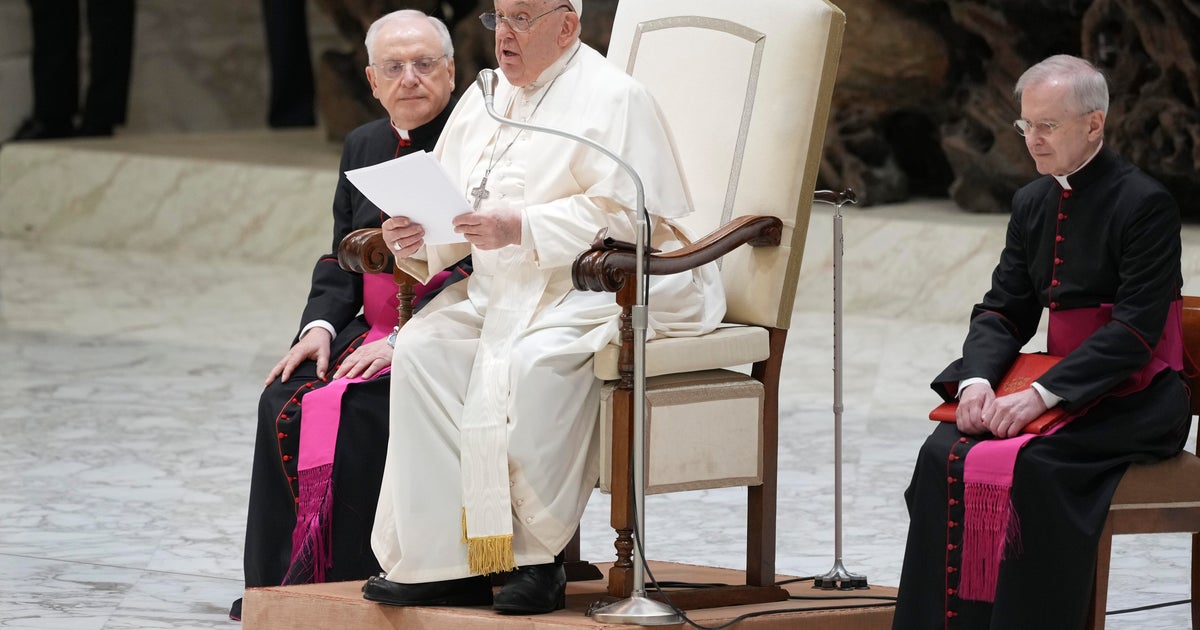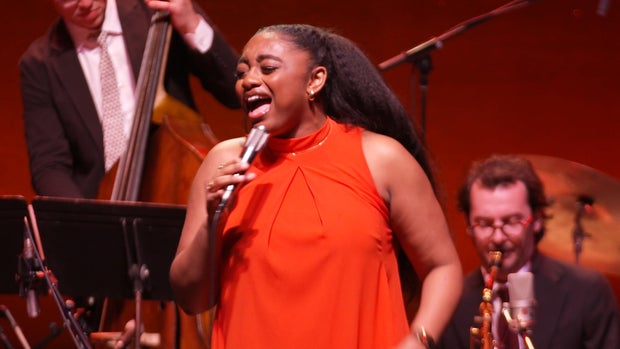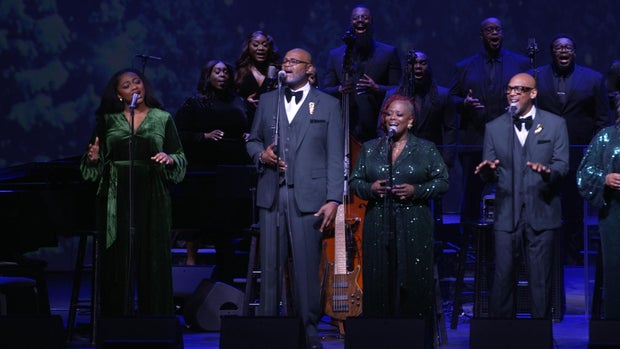CBS News
What’s driving inflation, and how are Americans feeling about the economy?

Watch CBS News
Be the first to know
Get browser notifications for breaking news, live events, and exclusive reporting.
CBS News
Grammy-winning artist Samara Joy says music is how her family shares “love for each other”

In 2021, jazz vocalist Samara Joy graduated from college. Months later, she released her first album. Now, she has three. She’s won three Grammys and is up for two more for her latest Christmas release. Talk about joy to the world—she has sold-out concerts all over America and Europe and is lining them up in Asia and South America. Music critics are comparing her to jazz royalty Sarah Vaughan and Ella Fitzgerald. Not bad for what she calls an accidental career. We caught up with her Christmas tour, singing what else?
You may know Samara Joy as a jazz headliner, but come December, she’s just one of the McLendon family. This year, her foray into Christmas music scored two Grammy nominations.
It’s been a whirlwind few years.
She’s as surprised as anyone at her head spinning success. After all, much of the jazz she sings was last popular a half century ago. But with a voice as limber as a gymnast…
She’s given the old standards a cool new gloss.
Hard to believe that jazz was something she sort of stumbled upon.
Samara speaking during Purchase College concert: Freshman me had no idea that this was in store. Okay, that three years after graduation, I would be standing here before you like this.
60 Minutes
This was a homecoming: the first time Samara Joy had returned to Purchase College in New York, where she studied jazz.
It almost didn’t happen. She told us it was a toss-up between business or music.
Bill Whitaker: Well one of your professors told us that when you showed up for your audition that you only had one song prepared?
Samara Joy: I was like “this is the only jazz song that I know.” He allowed me to sing a hymn too, which was very nice of him. Very kind of him. Um but that was what I had to offer at that time.
Bill Whitaker: So what was it that pushed you on that path?
Samara Joy: I never wanted to regret it. I felt like I could always – even if I was in school for music, I could always get another job. But I – I just wanted to prioritize it first.
Bill Whitaker: Worked out.
Samara Joy: Worked out. I’d say so.
She recorded her first songs in college—with help from her professors—and posted them online.
Soon, she had a record deal. Critics say she sings like an old soul.
But when she got her first Grammy nominations in 2022, she went full Gen Z, sharing the moment with millions online.
Bill Whitaker: You danced? You, you shouted?
Samara Joy: Yeah, in New York, nobody cared. Nobody cared at all. They’re like, “Just another Tuesday” to them.
And then…
She won. Both. Including the Grammy for best new artist.
Samara Joy during Grammy acceptance speech: Oh my gosh, I can’t even believe—I’ve been watching y’all on TV for like so long. So, to be here with you all, I’m so, so grateful, thank you.
Bill Whitaker: So where are you keeping all this golden hardware?
Samara Joy: They’re with my parents.
Bill Whitaker: They knew you wanted to do this?
Samara Joy: Yeah. And my dad, you know, he’s a singer and a musician. My grandparents were singers. And my aunts and uncles. Music is a part of my family. It’s an integral part of how we express ourselves and share, you know, love for each other.
Bill Whitaker: So there was no way you were gonna be an accountant?
Samara Joy: Nope.
60 Minutes
Joy celebrated online too. Her Instagram and TikTok accounts are pulling in a younger crowd, a rarity in jazz. They come for the ride and stay for the music.
Now with a bigger band, Samara Joy’s third album, “Portrait,” is her most ambitious yet.
She’s writing her own songs, drawing inspiration from the jazz canon of the 1940s and 50s.
Bill Whitaker: And you’re how old now?
Samara Joy: Twenty-four. Oh gosh. I just turned 25. I forgot.
Bill Whitaker: What do you think when you hear yourself compared to Sarah Vaughan and Ella Fitzgerald?
Samara Joy: When I first got to Purchase, Ella and Sarah were the first people that I listened to. They were part of my fundamental, you know, core and fundamental foundation.
Bill Whitaker: How do you make Ella fit you?
Samara Joy: Listening to her, and listening to all of these singers, I feel like it allowed me to, to shape my idea of what my role could be as a vocalist. Not just learn the melody, sing the melody and that’s it. But you really have to think like a musician and open your ears to what’s happening around you so that you can contribute to it and interact with it.
Christian McBride: Her voice is going to be remembered for a long, long time.
Christian McBride is a world-renowned bassist, we met him at Minton’s Jazz Club in Harlem. McBride told us, joy is a once-in-a-generation talent. He first heard her sing in 2019. He was a judge in a competition she had entered.
Bill Whitaker: And in comes Samara Joy and you’re goin—what?
Christian McBride: We see this young woman with this voice. She had such a mature sound and a way of having you believe what she was singing. We’re like, “Huh? Who—whose grandma’s in that little body, in that young body, you know?”
She was born Samara McLendon. Joy is her middle name but she’ll tell you the McLendon name is her secret power. Her grandfather sang with the acclaimed Savettes, a gospel group out of Philadelphia. Her father toured with gospel superstar Andrae Crouch. Gospel was the lifeblood of the McLendon household.
Bill Whitaker: So how does gospel fit in with your music?
Samara Joy: It’s an inspiration and a—an influence that will never go away in my voice. And I don’t want it to. It’s been a part of my life, and in my ears, and in my voice um for so long that it’s just an innate part of who I am, I feel like and it just reminds me that this is, this is for a higher purpose.
Christian McBride told us, Joy’s gospel upbringing gives her voice an emotional depth not all jazz singers can muster.
Christian McBride: In jazz, you get points for being smart. You get points for being creative. You don’t always get points for tapping into the emotional pool. And I find that um, all of my favorite singers who come outta church—Sarah Vaughan being one of them, Aretha Franklin, obviously all – all the way down through somebody like Samara, there’s that little thing. They, they can get here quicker, you know?
Bill Whitaker: You grew up with R&B and gospel and you could’ve gone in that direction but you chose to go toward jazz, why?
Samara Joy: If anything I kinda felt at home with jazz, you know. I felt like I could still be myself while I was learning about all of this – this new language. I could still absorb it and then apply it in my own way.
She was raised in a close-knit family in the Bronx. So how do you know a McLendon? Give ’em a mic. It’s a family joke, but everybody sang. All the time.
60 Minutes
Joy’s father told us, his daughter was always experimenting.
Or mimicking artists on the radio. so when Tony McLendon joined us, we had to ask…
Bill Whitaker: So I understand that um, you two are pretty good at car karaoke?
Tony McLendon: Oh, yeah.
Bill Whitaker: Can you give us a little taste?
Samara Joy: (Bursts into laughter) We, okay, so we did go to the um, the Stevie Wonder concert. And on the way home we were singing along to one of my favorite deep cuts of Stevie.
Samara Joy: See, if—another thing about a McLendon, we don’t remember the words to anything.
Tony McLendon: We don’t remember.
We met more McLendons as part of Joy’s Christmas tour in Morristown, New Jersey…
…where she was joined by her dad, her cousins and an uncle.
No one is more pivotal to the McLendon family than its 94-year-old patriarch, Elder Goldwire, Joy’s grandfather. He told us, he was in awe of her. And you just know what happened next…
But nothing prepared us for the power Elder Goldwire unleashed on stage. His frailty vanished.
The McLendon legacy looks to be in safe hands with Samara Joy. She may not have planned for a career in jazz but she told us, she thinks she’ll stick with it.
Produced by Heather Abbott and LaCrai Scott. Associate producer, Mariah Johnson. Edited by Craig Crawford.
CBS News
Samara Joy bringing gospel and family into her jazz music | 60 Minutes

Jazz vocalist Samara Joy, now 25, has won three Grammys. But when she auditioned for the jazz studies program in college, she says she knew just one jazz song.
That jazz song, and a hymn, got her through the audition in college, and now Joy is selling out concerts across the U.S. and Europe.
“I never wanted to regret it,” she said. “I felt like I could always, even if I was in school for music, I could always get another job,” she said. “I just wanted to prioritize it first.”
The McLendon legacy
Joy may not have been read in on the jazz scene when she started at Purchase College in New York, but the Bronx native grew up in a musical family. And those Grammys she won? They’re with her parents.
“Music is part of my family,” Joy said. “It’s an integral part of how we express ourselves and share, you know, love for each other.”
Joy’s dad, grandparents, aunts and uncles are all singers. Her grandfather, 94-year-old Elder Goldwire, sang with the acclaimed Savettes, a gospel group out of Philadelphia. Joy’s father, Tony McLendon, toured with gospel superstar Andrae Crouch.
60 Minutes
Gospel was the lifeblood of the McLendon household. Growing up surrounded by gospel music inspired Joy and influenced her voice, she said.
“[It’s] been a part of my life, and in my ears, and in my voice for so long that it’s just an innate part of who I am,” she said. “It just reminds me that this is, this is for a higher purpose.”
Gospel influencing Joy as a jazz singer
Christian McBride, a world-renowned bassist who first heard Joy sing in 2019, said he heard something special in Joy’s voice. He was judging a competition Joy had entered at the time.
“She had such a mature sound and a way of having you believe what she was singing,” McBride said. “And we’re like, ‘Huh? Whose grandma is in that little body, in that young body?'”
He believes Joy’s gospel upbringing gives her voice an emotional depth not all jazz singers can muster.
“In jazz, you get points for being smart. You get points for being creative. You don’t always get points for tapping into the emotional pool,” McBride said.
Joy intentionally leaned toward jazz professionally, even though she grew up with R&B and gospel.
“If anything I kind of felt at home with jazz,” she said. “I felt like I could still be myself while I was learning about all of this, this new language. I could still absorb it and then apply it in my own way.”
Bringing her music to the world
Joy recorded her first songs in college, with help from her professors, and posted them online. Soon, she had a record deal. Joy released her first album just months after her 2021 graduation.
She got her first Grammy nominations in 2022. Joy won both, including the Grammy for best new artist.
Now with a bigger band, her third album, “Portrait,” is her most ambitious yet. She’s writing her own songs, drawing inspiration from the jazz canon of the 1940s and 1950s.
60 Minutes
Music critics are comparing her to jazz royalty Sarah Vaughan and Ella Fitzgerald.
“When I first got to Purchase, Ella and Sarah were the first people that I listened to,” Joy said of the comparison. “They were part of my fundamental, you know, core and fundamental foundation.”
From there, it was about making the music of jazz greats like Fitzgerald her own.
“Listening to her, and listening to all of these singers, I feel like it allowed me to, to shape my idea of what my role could be as a vocalist. Not just learn the melody, sing the melody and that’s it,” Joy said. “But you really have to think like a musician and open your ears to what’s happening around you so that you can contribute to it and interact with it.”
CBS News
How Hezbollah’s losses have weakened Iran’s power and influence

On Sept. 17, almost a year into an escalating conflict with Israel, militants in the Iranian-backed terrorist group Hezbollah heard an urgent ringtone call out from their model AR-924 pagers.
They had no idea that the devices they pulled out of their pockets were bombs.
After the Israeli intelligence agency Mossad detonated the pagers, and walkie-talkies that had also been rigged with explosives, around 3,000 people were injured, some blinded or severely maimed. About 30 people were killed, including two children.
A recently retired Mossad agent, speaking with 60 Minutes correspondent Lesley Stahl under an alias, “Gabriel,” said killing Hezbollah militants wasn’t their primary goal: they wanted to send a message.
“Those people, without hands and eyes, are living proof, walking in Lebanon…of our superiority all around the Middle East.”
Ten days after that attack, a massive Israeli airstrike pounded southern Beirut, assassinating Hezbollah’s leader, Hassan Nasrallah. Other high-ranking Hezbollah commanders and officials were also killed by Israeli forces within just over a week.
“And once that happened, pretty much the entire organization, Hezbollah, kind of imploded,” Stahl explained.
In an interview with 60 Minutes Overtime, Stahl discussed the Israeli-Hezbollah ceasefire, the apparent diminished power of the Iranian regime after Hezbollah’s decimation in Lebanon, and shortly thereafter the fall of Syria’s president Bashar al-Assad.
Ceasefire
The day after Hamas attacked Israel on Oct. 7, 2023, Hezbollah militants rained rocket fire on Israeli towns near the border of Lebanon.
What followed was over a year of escalating combat. Israeli air strikes hit parts of Beirut and southern Lebanon. Anti-tank missiles and rockets were fired into Israel by Hezbollah militants.
Now, after 14 months, the fighting has mostly stopped, with Hezbollah and Israel agreeing to a ceasefire brokered by the United States and France.
In the first week of December, 60 Minutes’ Stahl traveled to northern Israel, to a town called Shtula, where Lieutenant Colonel Jordan of the Israeli Defense Force showed Stahl homes that had been destroyed by Hezbollah.
Stahl asked Lt. Col. Jordan if the ceasefire between Israel and Hezbollah was still holding.
“The state of Israel’s committed to upholding the ceasefire. Having said that, we have the right to use force to eliminate threats or violations,” he said.
Lt. Col. Jordan told 60 Minutes that Hezbollah had fired shells into Israel the day before and IDF forces had responded “very, very sharply to this attack.”
Stahl asked what a violation of the ceasefire looked like, in the opinion of the Israelis.
“Movement of men and material in a manner that threatens the civilian population, we’re going to attack,” he responded.
Both Israel and Hezbollah have accused each other of violating the ceasefire since they entered into the agreement.
During the first weeks of the ceasefire, Hezbollah fired projectiles into Israel and Israel conducted airstrikes against targets it said had committed violations of the agreement.
But despite these exchanges, the fragile ceasefire still holds.
Raghida Dergham, a Lebanese American columnist and executive chairman of the Beirut Institute, told Stahl in an interview that the citizens of Lebanon believe the ceasefire is holding and will continue to do so.
“The ceasefire is holding… everybody is hoping that it will be lasting and believes it will be lasting,” she said.
According to the ceasefire terms, the Lebanese government is required to take back control of southern Lebanon, where Hezbollah has maintained a military presence since the 1980s.
“The Lebanese did not want Hezbollah to stay in control of the South… every now and then, they decide they want to take the country to war,” Dergham told 60 Minutes Overtime.
“What Lebanese want now is for the Lebanese Army to take over, to be in control in the South, and beyond.”
The terms also require that the Lebanese government prevent Hezbollah from conducting military operations against Israel, and to dismantle any weapons that they find.
While 60 Minutes was in Shtula, Israel, Lt. Col. Jordan said some Israeli residents felt the area was safe enough to come back to their homes and check for damage. But the town was still mostly empty.
On the other side of the border, an estimated one million Lebanese citizens were displaced due to the fighting in southern Lebanon. Many returned home after the ceasefire, despite safety concerns.
The Israeli government has advised some Lebanese citizens to avoid returning to specific areas in southern Lebanon.
During the conflict, Israeli air strikes turned entire buildings and streets in southern Lebanon into rubble. Many Lebanese civilians, including children and healthcare workers, were killed in these air strikes over the 14 months of fighting.
“Civilians were killed. Civilians were driven out of their homes,” Dergham told Stahl.
“Even the Lebanese who hated Hezbollah… [were] horrified by the extent of damage that’s happened to our brothers and sisters in the south of Lebanon.”‘
Israeli Lieutenant Colonel Jordan of the IDF said some villages were seized by Hezbollah militants and used as “military assets” to store weapons, and that they had been destroyed by the Israeli forces.
The IDF estimates it has destroyed about 80% of Hezbollah’s weapons.
Lt. Col. Jordan said the Israeli forces will not allow Hezbollah to regroup and return to its status as a powerful, aggressive fighting force.
“We’ve degraded their arsenal, their capabilities, but they’re still a significant fighting force,” Lt. Col. Jordan told Stahl.
“We will not let them get back to where they were before this past September…it’s not going to happen.”
Hezbollah and Iran
Sima Shine is a former Mossad analyst and current director of the Iran and the Shi’ite Axis research program at the Institute for National Security Studies in Tel Aviv.
She told 60 Minutes that Hezbollah has been “defeated to a certain degree” and that the assassination of its head Nasrallah, and other leadership figures, was a devastating blow.
“They are a completely different organization. They don’t have the leadership,” she told 60 Minutes in an interview.
“And the leadership is not only Nasrallah. It’s the whole people around him, going with him, 30 years together. …[they’re] not capable of organizing themselves the way that they’ve been before.”
Lebanese American columnist Raghida Dergham told Stahl she also sees the pager operation as a significant factor in the undermining of Hezbollah, especially when the Nasrallah assassination, that came right after, is considered.
“It absolutely broke the backbone of the Hezbollah operatives… I think [the Israelis] had a very good idea of what they were doing in that,” she told Stahl.
Retired Israeli intelligence analyst Sima Shine said the organization still lives on in other ways. Importantly, they will continue as a political organization in Lebanon’s government, with ministers in the Council of Ministers and MPs in Lebanon’s parliament.
Shine said the party became less popular after the pager attack and the group’s decision to bring Lebanon into a war with Israel, which was perceived by its critics as a political priority of Iran and not necessarily of the Lebanese people.
“At the end of the day, it’s a party… [but] their strength today is completely different in the political sphere,” she told Stahl.
“Everybody that is opposing Hezbollah believes that Hezbollah is actually fulfilling [the] orders of Iran and not the interest of Lebanon.”
Dergham agrees that the Hezbollah political organization is still “powerful, but not as powerful” as one of two representative parties of the Shiite Muslim community.
“So, they are weakened, but they’re here… we want them to reinvent themselves to be part of the new Lebanon,” she told Stahl.
Both Shine and Dergham agree that the proxy war strategy Iran has pursued with Hezbollah for decades, using it as an apparatus for its own national security and influence in the Middle East, is failing.
“The broader, strategic picture is a huge failure of the whole strategy that was built in the last two, three decades,” Shine told Stahl.
“Everything they have planned… to keep the world far away from Iran’s territory, actually failed.”
Dergham said the recent fall of former Syrian President Bashar al-Assad, an ally of Iran who used Hezbollah fighters to stay in power, was a catastrophe for Iran and Hezbollah.
Since the rebel group Hay’at Tahrir al-Sham (HTS) has seized control of Syria, Hezbollah has been cut off from the country, an important military position and training ground.
Additionally, they’ve lost access to a critical corridor in Syria that Iran uses to supply them with weapons and material.
Dergham told Stahl that Hezbollah’s losses in Lebanon and Syria have weakened Iran “tremendously,” and that their proxy war strategy is not working.
“It has to review its raison d’etre. It cannot use proxies anymore. And that will change the face of the region.”
The video above was produced by Will Croxton. It was edited by Matthew Lev. Jane Greeley was the broadcast associate.
Photos and video courtesy of Getty Images, Storyful and AFP.












